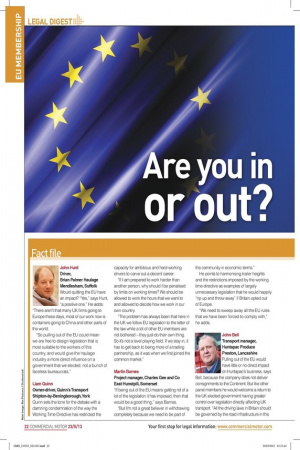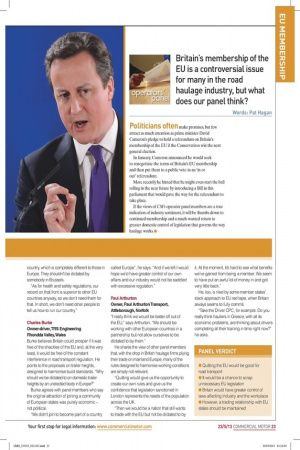Britain's membership of the EU is a controversial issue for
Page 17

Page 18

If you've noticed an error in this article please click here to report it so we can fix it.
many in the road haulage industry, but what does our panel think?
Nords: Pat Hagan Politicians often make promises, but few attract as much attention as prime minister David Cameron's pledge to hold a referendum on Britain's membership of the EU if the Conservatives win the next general election.
In January, Cameron announced he would seek to renegotiate the terms of Britain's EU membership and then put them to a public vote in an 'in or out' referendum.
More recently he hinted that he might even start the ball rolling in the near future by introducing a Bill in this parliament that would pave the way for the referendum to take place.
If the views of CM'S operator panel members are a true indication of industry sentiment, it will be thumbs down to continued membership and a much-wanted return to greater domestic control of legislation that governs the way haulage works. • John Hunt Driver, "So pulling out of the EU could mean we are free to design legislation that is most suitable to the workers of this country, and would give the haulage industry a more direct influence on a government that we elected, not a bunch of faceless bureaucrats."
Liam Quinn Owner-driver, Quinn's Transport Shipton-by-Beningborough,York Quinn sets the tone for the debate with a damning condemnation of the way the Working Time Directive has restricted the capacity for ambitious and hard-working drivers to carve out a decent career.
"If I am prepared to work harder than another person, why should I be penalised by limits on working times? We should be allowed to work the hours that we want to and allowed to decide how we work in our own country.
"The problem has always been that here in the UK we follow EU legislation to the letter of the law while a lot of other EU members are not bothered —they just do their own thing. So it's not a level playing field. If we stay in, it has to get back to being more of a trading partnership, as it was when we first joined the common market."
Martin Barnes Project manager, Charles Gee and Co East Hunstpill, Somerset "If being out of the EU means getting rid of a lot of the legislation it has imposed, then that would be a good thing," says Barnes.
"But I'm not a great believer in withdrawing completely because we need to be part of the community in economic terms."
He points to harmonising trailer heights and the restrictions imposed by the working time directive as examples of largely unnecessary legislation that he would happily "rip up and throw away" if Britain opted out of Europe.
"We need to sweep away all the EU rules that we have been forced to comply with," he adds.
John Bell Transport manager, Huntapac Produce Preston, Lancashire Pulling out of the EU would have little or no direct impact on Huntapac's business, says Bell, because the company does not deliver consignments to the Continent. But like other panel members he would welcome a return to the UK elected government having greater control over legislation directly affecting UK transport. "All the driving laws in Britain should be governed by the road infrastructure in this country, which is completely different to those in Europe. They shouldn't be dictated by somebody in Brussels.
"As for health and safety regulations, our record on that front is superior to other EU countries anyway, so we don't need them for that. In short, we don't need other people to tell us how to run our country."
Charles Burke Owner-driver,TRS Engineering Rhondda Valley, Wales Burke believes Britain could prosper if it was free of the shackles of the EU and, at the very least, it would be free of the constant interference in road transport regulation. He points to the proposals on trailer heights, designed to harmonise build standards. "Why should we be dictated to on domestic trailer heights by an unelected body in Europe?"
Burke agrees with panel members who say the original attraction of joining a community of European states was purely economic — not political.
"We didn't join to become part of a country called Europe", he says. "And if we left I would hope we'd have greater control of our own affairs and our industry would not be saddled with excessive regulation."
Paul Arthurton Owner, Paul Arthurton Transport, Attleborough, Norfolk "I really think we would be better off out of the EU," says Arthurton. "We should be working with other European countries in a partnership but not allow ourselves to be dictated to by them."
He shares the view of other panel members that, with the drop in British haulage firms plying their trade on mainland Europe, many of the rules designed to harmonise working conditions are simply not relevant.
"Quitting would give us the opportunity to create our own rules and give us the confidence that legislation sanctioned in London represents the needs of the population across the UK.
"Then we would be a nation that still wants to trade with the EU but not be dictated to by it. At the moment, it's hard to see what benefits we've gained from being a member. We seem to have put an awful lot of money in and got very little back."
He, too, is riled by some member states' slack approach to EU red tape, when Britain always seems to fully commit.
"Take the Driver CPC, for example. Do you really think hauliers in Greece, with all its economic problems, are thinking about drivers completing all their training in time right now?" he asks.
PANEL VERDICT • Quitting the EU would be good for road transport • It would be a chance to scrap unnecessary EU legislation • Britain would have greater control of laws affecting industry and the workplace • However, a trading relationship with EU states should be maintained









































